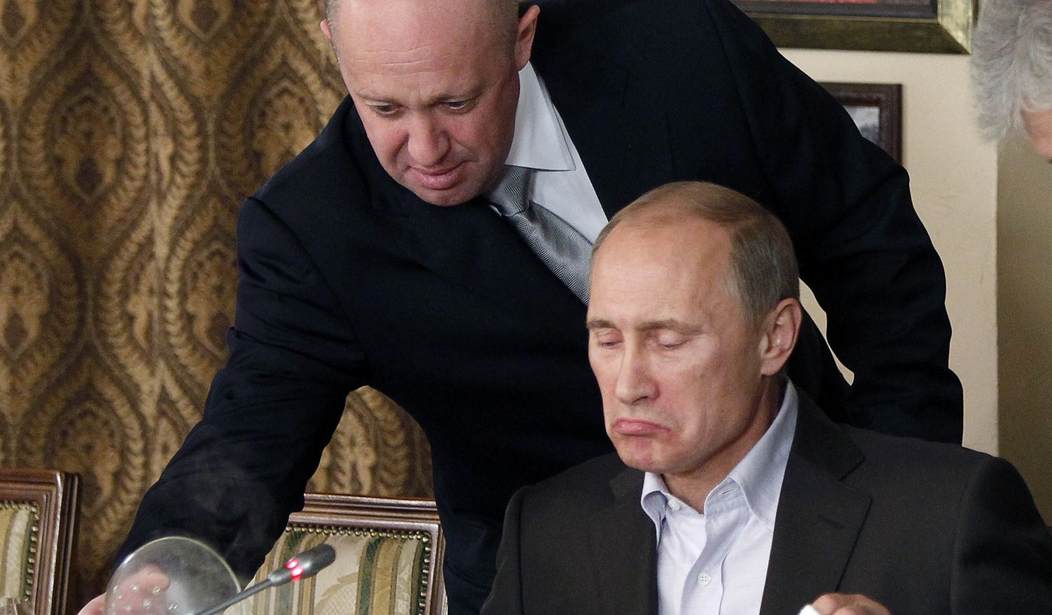“When you strike at a king, you must kill him,” Ralph Waldo Emerson warned. But what if the “king” being struck at in Russia’s weird weekend mutiny wasn’t actually Russian strongman Vladimir Putin?
Wagner Group mercenary chief — and onetime “Putin’s chef” — Yevgeny Prigozhin led what looked like a coup attempt for roughly 24 tense hours on Friday and Saturday. His mercenary army of trained professionals, thugs, and convicts seized control of Rostov-on-Don and the Southern Military District headquarters against little opposition. A second column of Wagner troops made it almost as close to Moscow as Hitler’s armies did in the winter of 1941 before being called off.
Prigozhin’s demand was the removal of Russian defense minister Sergei Shoigu and other senior leaders of an “oligarchic clan” for misleading Putin and the nation about the war. Since Prigozhin never called for Putin’s ouster and was instead focused on the military leadership, it would be more accurate to call the events a mutiny rather than a coup attempt.
“All these bastards ought to be sent to the front barefoot with just a submachine gun,” Prigozhin said of Russia’s military leadership last October.
Even so, ISW wrote when the mutiny was just getting started that “Prigozhin may have wildly miscalculated.” Shoigu and Putin both survived with their positions intact, Wagner Group forces will be integrated into the Russian army, and Prigozhin faces what looks like exile in Belarus, so he must have “wildly miscalculated,” right?
Maybe, maybe not.
I’m no stranger to the rivalry between Prigozhin and Putin. Back in November when Prigozhin was forming “parallel military structures in Belgorod and Kursk oblasts” I noted that it “appears that there’s a growing force of privately-held ground units headed by a man with his own agenda” and cheekily suggested that Putin “sleep tight.”
Eight months later an armored column was moving on Moscow, even if only briefly.
Earlier this month, after they were withdrawn from the front lines in Ukraine, Prigozhin was ordered to begin integrating Wagner units with the Russian army — a move he resisted. He and Wagner were rightly seen as a potential threat to Moscow and integration was Putin’s solution to sidelining the threat.
Maybe Prigozhin’s abortive mutiny was less of a wild miscalculation and more of a last-ditch roll of the dice to keep whatever he could of Wagner — and his own hide.
Military analyst Rob Lee (one of the best) noted in the wee small hours of Monday morning that it’s “Still unclear what the actual terms of the agreement are that Prigozhin reached with the Kremlin.”
What we do know is that Putin himself called the mutiny “treason” and promised to take “harsh steps” to put it down. You don’t have to go too deep into Russian history to know that the punishment for treason is death. Prigozhin’s survival makes Putin appear weak although, to be fair, Prigozhin is going to need a food taster and to avoid multiple-story buildings for as long as he wishes to continue living.
Moscow had been trying to sideline Prigozhin and Wagner for months. Now, even after an embarrassing mutiny, Prigozhin survives. What if Prigozhin himself was the king being struck at but who still lives?
At this point, we barely know what we don’t know. But maybe the biggest mystery of all is why Prigozhin stood down just when it looked like he was on the verge of success. We can only conjecture but, out of all the wild-a**-guesses I’ve seen on the news and online, this one is certainly the most interesting:
Prigozhin capturing Voronezh-45 nuclear storage facility in Russia may be part of the key to the lock that can help explain his decision to suddenly and bizarrely 'end' the coup which was succeeding spectacularly. I've been trying to figure how Prigozhin can guarantee his own… https://t.co/0n34YAu5Mn pic.twitter.com/H6APVMhfkI
— Igor Sushko (@igorsushko) June 25, 2023
Is a former Kremlin caterer named Yevgeny Prigozhin, who somehow ended up owning his own private army, now a nuclear power? It’s such a wild notion that I hesitate even to entertain it, and yet here we are.
Stay tuned…
Recommended: Bud Light Begs, ‘Please Drink Our Beer Again, You Oafish Hicks’










Join the conversation as a VIP Member